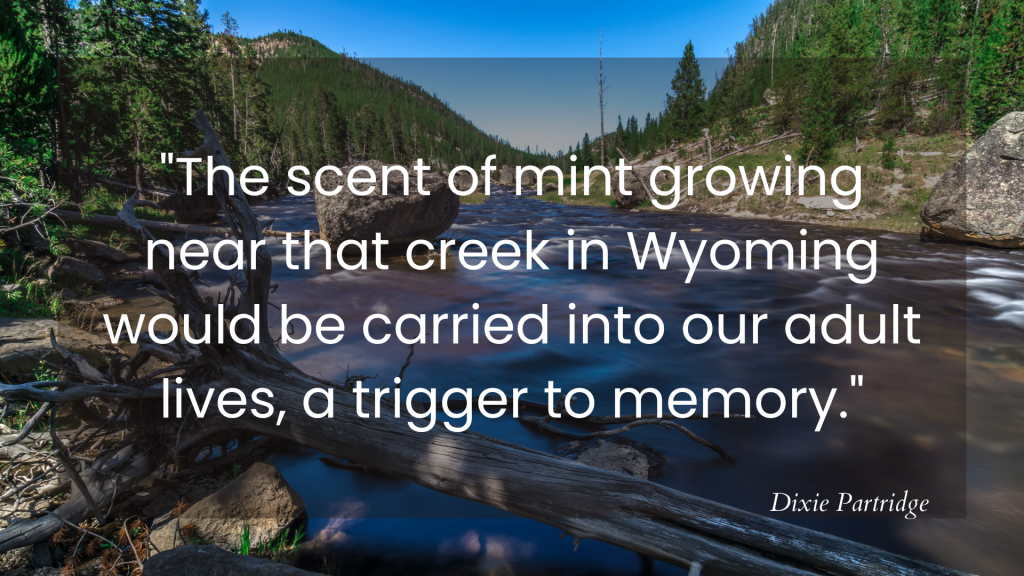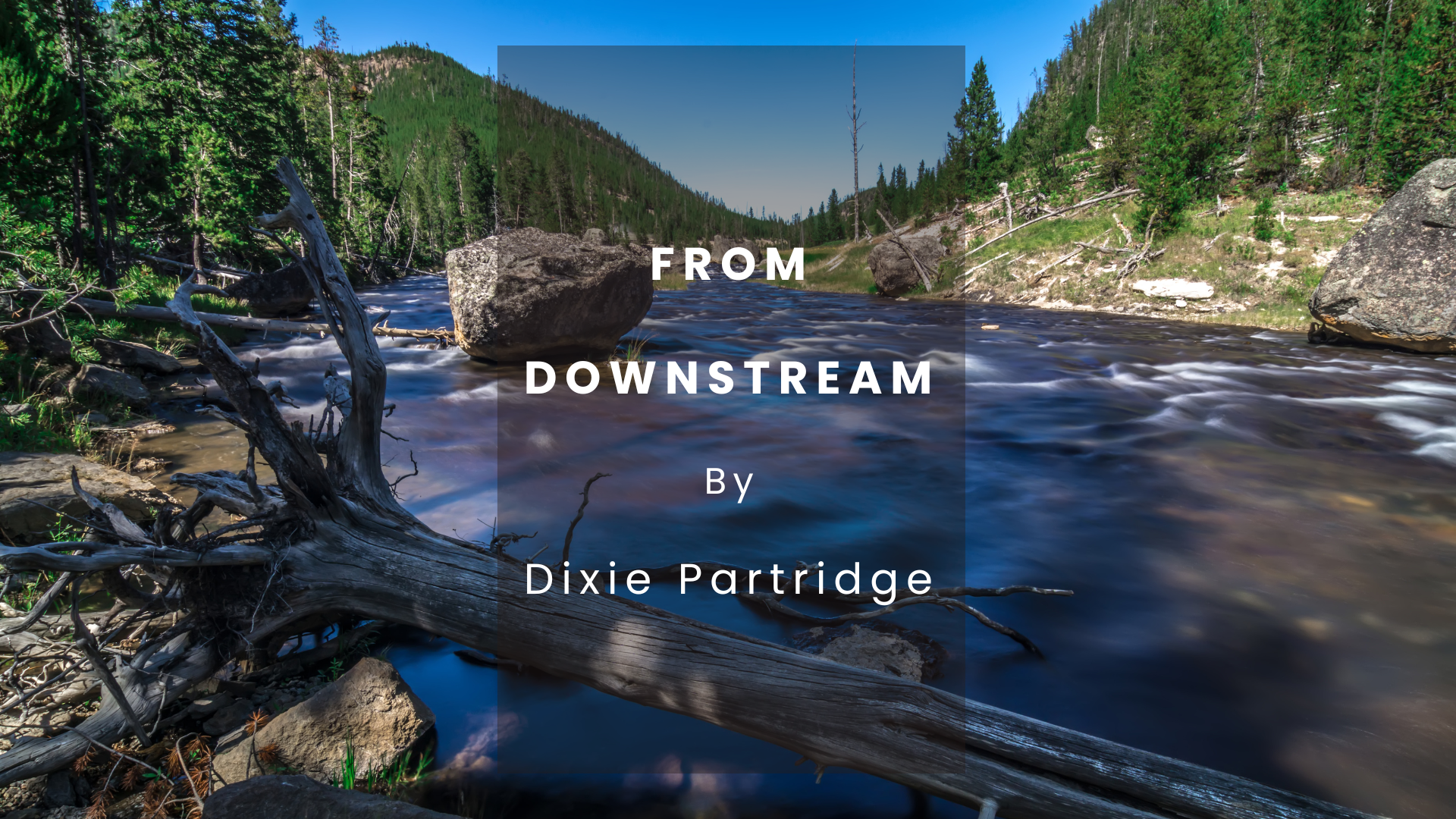Articles/Essays – Volume 57, No. 3
From Downstream
Whatever landscape a child is exposed to early on, that will be the sort of gauze through which he or she will see all the world afterward.
—Wallace Stegner
They must have had names. To us they were the creek, the tree, the mountain, and they filled the frescoed days of a time before we thought much about time.
In photographs on my wall, they don’t look the same. The early memories reach and fade into each other, overlapping my sister and me with infusions of light absent in photos. Even the rain was a kind of light, giving back wavery colors of those places waiting for us.
The scent of mint growing near that creek in Wyoming would be carried into our adult lives, a trigger to memory. Years later and states away, near our back fence mint multiplies from a paper-cup sprig once brought home by our second grader. Breathing in, I can feel the long-ago uneven slope down to the stream over stones, the barn loft open fifty yards behind me, the tree reaching toward water with giant roots and tips of low branches. The ridged trunk forked near enough to pasture ground that we could climb in to wedge ourselves, feet against one side and back against the other. Higher up, we could, if we chose, occupy an instant secrecy above our mother’s call, our father’s reach.
The mountain, covered with brush and north-slope pines, provided a mural, canvas backdrop to our play. Our attempts to scale its craggy sides sent us back downstream, knowing its hugeness out of reach. But it felt in-place, lit with the western sun far into evening. Mornings, it slowed the dawn, its massive shadow scrolling back toward us with a mystery of time delayed, as sunlight across the valley lay open, bright and early.

In spring seasons with high runoff, the creek flooded, leaving us stranded as the tree and barn, unable to reach what we deemed necessities of childhood. We watched our parents in tall boots rescuing calves, herding livestock into the barn on higher ground. At night the uncommon sound of wild water reached our upstairs window, telling us morning would be other than we wanted. We waited in apprehension to rebuild our stone bridges and coves along the mint.
The creek later became its name, Dry Creek, dammed upstream for sprinkler systems. Alone beside it, the tree was cottonwood when a photographer for the high school yearbook selected it for the inside cover. The unnamed images of moving light seem more true, while the cottonwood remains unchanged in the photograph, the camera a lens without memory. I have found no other name, still, for the mountain.
***
Does memory define who we are? What about all that we forget, or imagine? Entering a canyon lodge where my father took us long ago, my voice feels off-key, the word nickelodeon something I strain to call back. But the Snake River behind the old lodge ran in my father’s memory as my own: the horse he rode carried away in night rapids, at last delivering him downstream onto an unfamiliar shore. All horses are good swimmers, my father told me to remember.
After my father’s tellings, I saw the action in my mind and in my dreams, as though I was there, somewhere just above him, watching it happen. I felt the power of swift currents and the large, moving muscles of the horse. And it’s all part of how in his over eighty years my father valued horses as partners, farming with them long after tractors were common in the valley. My mother drove a buck rake during haying each summer, pulled by a work team of black horses.
Summers when I was young, tourists on the way to Yellowstone on US 89 would stop with their cameras as though they had happened upon some past life preserved just for their review, leaving one of my brothers embarrassed, another amused.
***
Born on his family’s farm and never leaving home, my father taught me that both beauty and bread can satisfy hungers, to watch for the brief streak of a red fox along the edge of a field. He plowed around an abandoned fox den for years, hoping they would come back.
One day recently I read a quotation about work, attributed to Saint Benedict, and immediately associated it with my farming heritage and my parents: Laborare est orare. To work is to pray.
Somewhat inadvertently I think, my father taught me to contemplate what kinds of losses may matter to us most. I have lost his story that somehow connects this to his father’s early death, a card shark, and a debt. I seem to have lost whole pieces of childhood: what happened to that other tree for climbing in the north pasture, how a billboard for the cheese factory came to be in that spot. And I cannot recall where my father went for a full week one year (or why) when I was small, so unusual when the family took no vacations. I have only my mother’s words of explanation about a hunting friend and a lake called Jenny.
I have not lost the scent and textures of mown alfalfa and blue timothy fields, now growing his absence; nor how in some years, walking over depths of crusted snow, sinking in, one can feel steam rising from the insulated, plowed soil beneath. I have not lost the minute detail of light slanting on dust particles through rafters of a collapsing barn, nor how in dreams collapsing buildings can straighten and mend. Along the years, not knowing just how it happened, I came to sense that something had turned scriptural in the sound of the word pasture: its killdeer and meadow lark calls, buttercup and dandelion yellows, spring greenings and the dark swaths from drought that often came later in summer. Reinforcing this scriptural sense, I find one day in Psalm 16:6 these words: The lines have fallen to me in pleasant places; Indeed, my heritage is beautiful to me.
***
Separated for years by distance from my siblings, I have wondered: when we are very old, will we still wake in the night and for an instant see the window above our childhood beds, hear the clink of our mother’s pails on the way to the barn? Will we return again as part of our parents’ household, in dreams that suddenly banish the children of our own, our adult jobs and choices? To struggle as with half-familiar current, to anticipate the creek—flooding or dry, the tree lit with fresco light, the cottonwood turning on the yearbook cover?
When I was middle-aged and visiting the farm, my father told me that when you are old you dream old dreams, that awake, you don’t remember which came from living. And soon, he said, the difference doesn’t really matter.


 Back to full Issue
Back to full Issue

